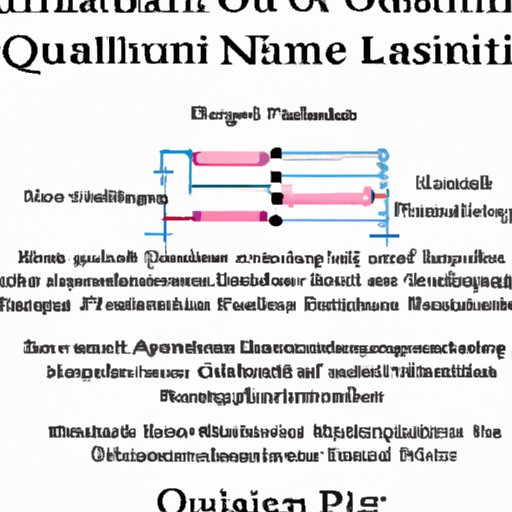Introduction
Quantum computing is a rapidly growing field that promises to revolutionize the way we process information. It has the potential to solve problems that are otherwise too complex for traditional computers. But what exactly is quantum computing, and how does one go about programming it? This article will provide an overview of quantum computing programming, explaining the basics of quantum mechanics, outlining essential tools and libraries, describing practical applications, examining challenges faced by quantum programmers, comparing different quantum computing programming languages, and presenting examples of quantum computing programs.
Explaining the Basics of Quantum Computing Programming
Before delving into the specifics of quantum computing programming, it’s important to understand the principles of quantum mechanics that make it possible. In classical computing, data is represented as binary digits (bits) that can either be 0 or 1. In quantum computing, data is represented as qubits (quantum bits), which can exist in multiple states simultaneously. This allows quantum computers to perform calculations much faster than traditional computers.
At the heart of quantum computing programming is the ability to manipulate qubits. This is done using quantum gates, which are operations that take one or more qubits as input and produce a new set of qubits as output. These gates are used to construct quantum algorithms, which are sets of instructions that tell the computer what operations to perform on the qubits. By combining these gates and algorithms, quantum programmers can create powerful programs that can solve problems that are too complex for traditional computers.

Outlining Essential Tools and Libraries for Quantum Programming
In order to program a quantum computer, programmers must have access to the right tools and libraries. The most popular quantum computing toolkits include Google’s Cirq, Microsoft’s Q#, and IBM’s Qiskit. These toolkits provide an easy-to-use interface for creating quantum algorithms and running them on quantum computers.
In addition to toolkits, there are several commonly used libraries and packages for quantum computing programming. These include PyQuil, a library for writing quantum programs in Python; OpenFermion, a library for simulating fermionic systems; and ProjectQ, a framework for compiling quantum programs.

Describing Practical Applications of Quantum Computing Programming
Quantum computing programming has already been used to develop real-world applications. For example, Google researchers used quantum computing programming to create a machine learning algorithm that can accurately identify objects in images. In addition, quantum computing programming has been used to simulate complex chemical reactions, which could help scientists develop new medicines and materials.
The benefits of using quantum computing programming go beyond just solving complex problems. Quantum computers are also able to run tasks much faster than traditional computers, making them ideal for time-sensitive applications such as financial trading and weather forecasting.

Examining Challenges Faced by Quantum Programmers
Despite its potential, quantum computing programming is still in its early stages and faces several challenges. One of the biggest challenges is the limited number of existing quantum computing platforms. Currently, there are only a handful of quantum computers available, and they are all limited in terms of their processing power and memory capacity.
Another challenge is the lack of experienced quantum programmers. As the field of quantum computing is relatively new, there are few experienced quantum programmers who are familiar with the necessary tools and techniques. This makes it difficult for organizations to find qualified personnel to develop quantum programs.
Finally, quantum computing programming is still in its infancy, and there is a lack of standardization. Different quantum computing platforms use different programming languages, and there is no consensus on which language is best suited for developing quantum programs.
Comparing Different Quantum Computing Programming Languages
There are several different quantum computing programming languages available, each with its own advantages and disadvantages. Popular languages include Q#, which is designed specifically for quantum programming; Python, which is widely used for general programming; and C++, which is often used for low-level programming.
Q# is the most popular language for quantum computing programming, as it is designed specifically for the task. However, it lacks the flexibility of other languages and is not well-suited for general-purpose programming. Python, on the other hand, is a versatile language that is easy to learn and can be used for both quantum and general-purpose programming. Finally, C++ is a powerful language that is often used for low-level programming, but it is not as user-friendly as Python.
Presenting Examples of Quantum Computing Programs
To get a better understanding of how quantum computing programming works, let’s look at some examples of quantum programs. Here is a simple program written in the Q# language that prints out the value of a qubit:
operation PrintQubitValue(qubit : Qubit) {
Message($"The value of the qubit is {M(qubit)}");
}
Here is a program written in Python that uses the PyQuil library to simulate a quantum circuit:
from pyquil import Program, get_qc
p = Program()
# define qubits
q0 = p.declare('q0', 'BIT')
# define classical registers
c0 = p.declare('c0', 'BIT')
# define quantum circuit
p += H(q0)
p += MEASURE(q0, c0)
# execute program
qc = get_qc('1q-qvm')
results = qc.run_and_measure(p, trials=10)
# print results
print(results)
Conclusion
Quantum computing programming is a rapidly evolving field that has the potential to revolutionize the way we process information. By understanding the basics of quantum mechanics, having access to the right tools and libraries, knowing how to apply quantum programming to solve real-world problems, and being aware of the challenges faced by quantum programmers, developers can begin to explore the possibilities of this emerging technology.
The future of quantum computing programming looks bright, and there are already many successful examples of quantum programs in the wild. As the field continues to evolve, programmers will need to become familiar with the different programming languages and stay up-to-date with the latest developments in the field.
(Note: Is this article not meeting your expectations? Do you have knowledge or insights to share? Unlock new opportunities and expand your reach by joining our authors team. Click Registration to join us and share your expertise with our readers.)
